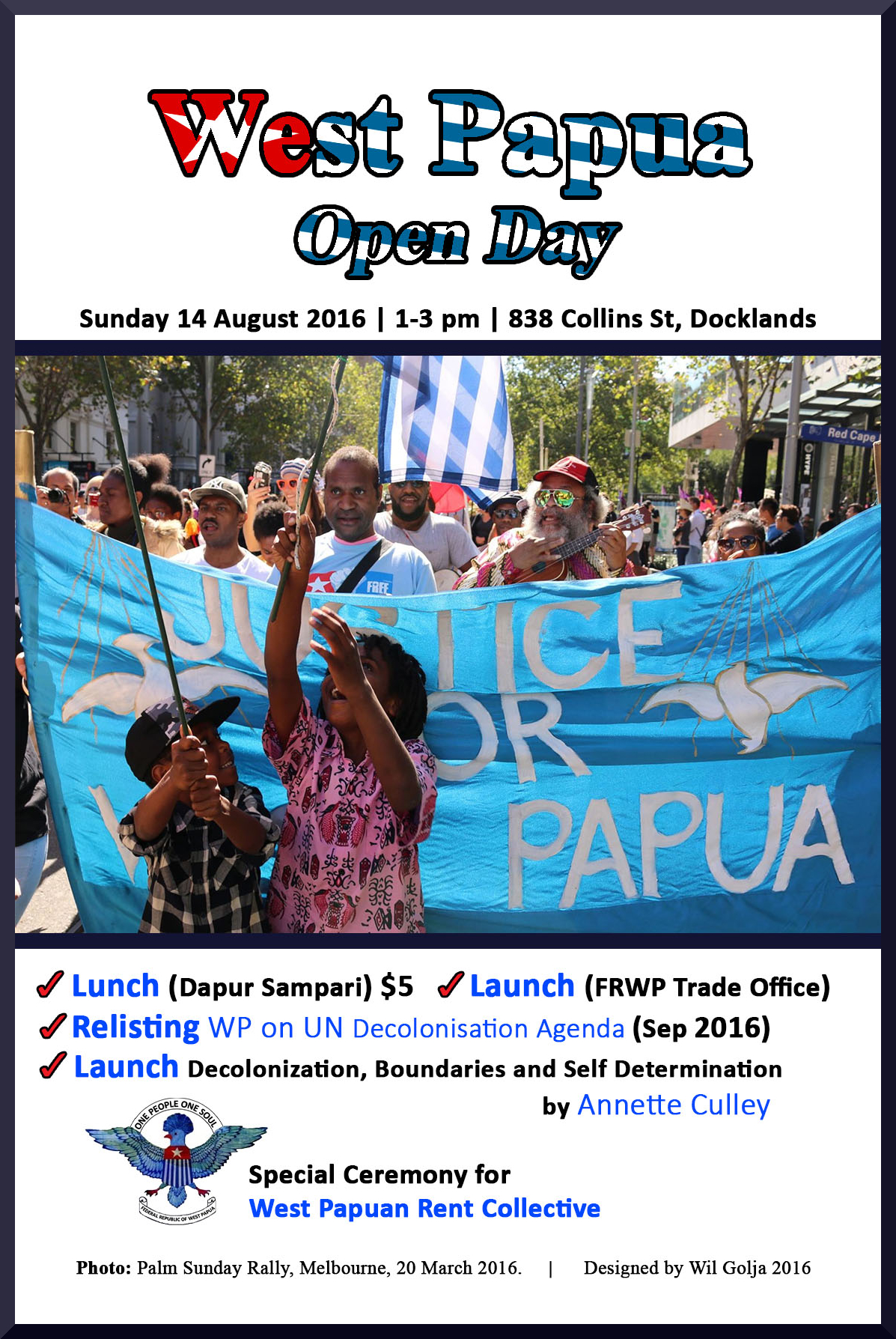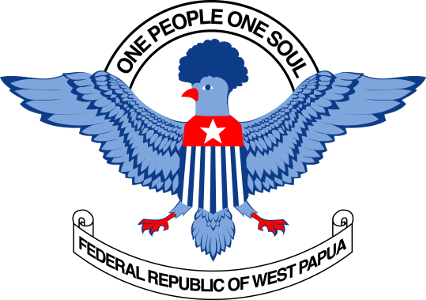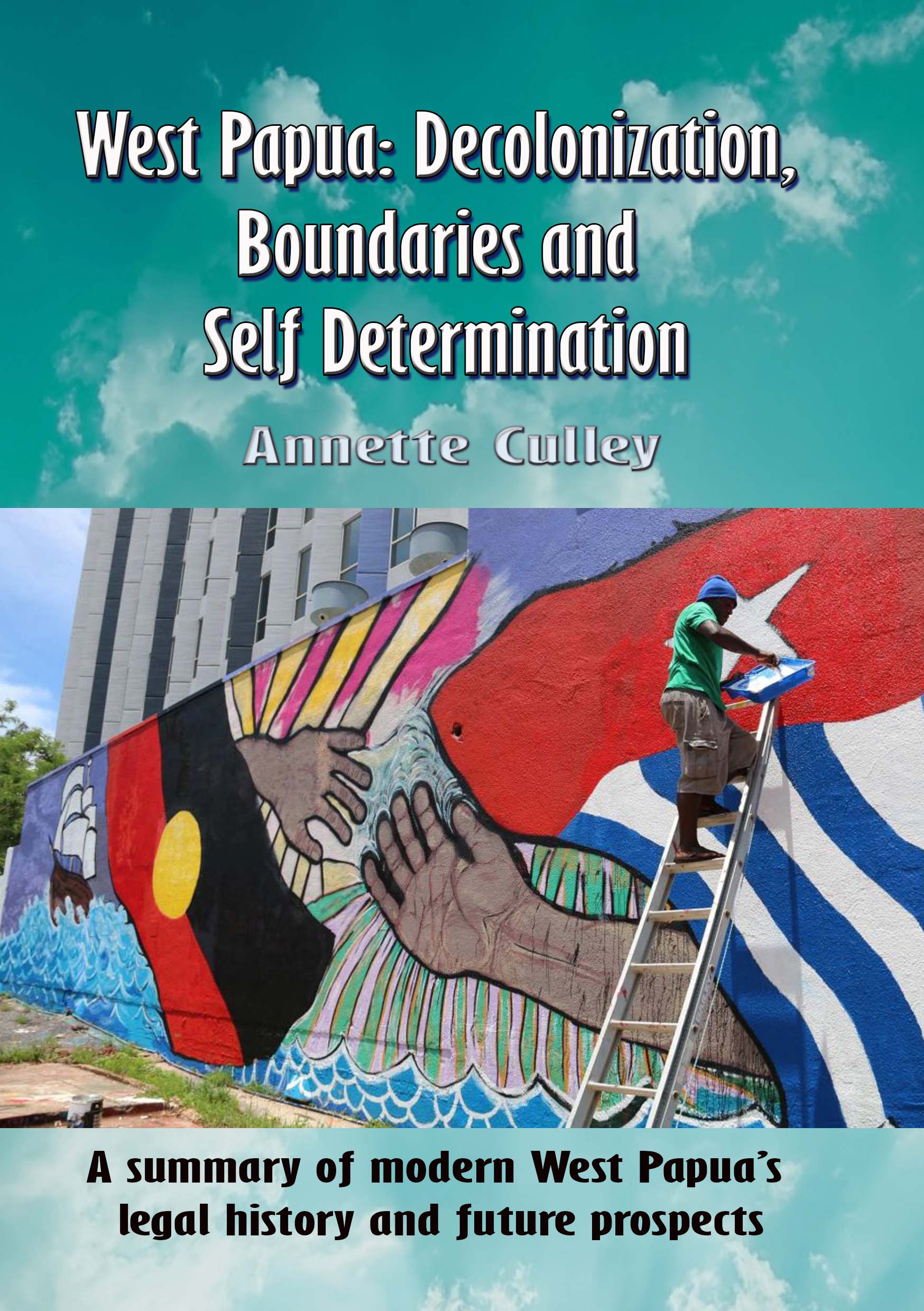
Annette Culley, West Papua Womens’ Office, Docklands (Australia).
“I have attempted to bring together all the UN resolutions, principles, and rules that have been applied, or ignored, in the case of West Papua’s occupation. This is my analysis of the relationship between occupied West Papua and international law, but it is also a commentary on how international law offers hope to the beleagured people. It traces how the focus of international law has shifted during the twentieth century from states’ rights to people’s rights, and how the norms of jus cogens (rules that cannot be derogated from) have broadened to include self-determination, genocide, slavery, torture, murder and the disappearance of individuals.”
“This is remarkable scholarship. It is the first comprehensive analysis of the legal processes used and abused by the international community to take possession of my homeland in the 1960s” (Jacob Rumbiak, FRWP Minister for Foreign Affairs, Immigration & Trade).
“I encourage all thinking international citizens to read this book. It is a most informative treatise on the legalities of West Papua’s struggle for independence and a remarkable treatment of the difficult principles of international law” (Glenn McGowan QC, Chair of the International Commission of Jurists in Victoria).
Excerpts from the Prologue
I had never heard of West Papua until I picked up a book called People of the Valley at my municipal library in the mid-1970’s. The book was written by an American photojournalist, Wyn Sargent, who with her interpreter, Sjamsuarni Sjam, lived for a time with different clans in the Baliem Valley in the highlands of West Papua.
The Indonesian police brutality horrified Wyn, and she worked to break down long-standing animosities between clans to strengthen their ability to cope with the racist administration. One endeavour involved a symbolic marriage with a highly respected chief, Kain Obaharok.
Wyn’s complaints and advocacy, including many letters to the Indonesian police and government, resulted in her being expelled from Indonesia. However, because she was a witness to the atrocities, Tempo eventually published her story, including a photograph of a Wamena native beaten by the Indonesian police. Sjam, who was hounded by Indonesian intelligence after Wyn returned to America, told her that her situation improved after the publication of the article.
I have never forgotten this book and always hoped to play a part in the West Papuans struggle. In the meantime I opened many of my conversations with ‘Do you know where West Papua is?’ Most replies were a blank or indifferent stare. Then one rainy day in March 2009, I saw two West Papuans handing out leaflets at Flinders St Train Station and offered to help.
They encouraged me to join their rallies outside the Indonesian Embassy, and in 2014, when the Federal Republic of West Papua opened an office in Docklands, I joined the Women’s Office.
I became intrigued by the legal underpinnings of Indonesia’s occupation, and concerned about how little we activists knew about them. That I am not a lawyer meant my journey of discovery was a bit haphazard, each hard-wrought bit of information leading to more questions. Indonesia had used the principle of uti possidetis [as you possess] to press its claim for sovereignty, so my first hurdle was to understand that elusive legal principle and work out how it had been extended to mean ‘sovereignty’ over West Papua. Suzanne Lalonde’ Determining boundaries in a conflicted world: the role of uti possidetis proved a useful text, primarily because of her great interest in interstate relations, namely sovereignty, territory and boundaries.
The formation of the United Nations after World War Two opened a period of rapid development in international law. Jurist Christian Tomuschat believes UN Resolution 1514 (XV) 1960 On the granting of independence to colonial countries and peoples was ‘an almost revolutionary act’ because it transformed the principle of self-determination into a legal right for non-self-governing people. Antonio Cassese refers to West Papua as a ‘case where the principle of self-determination was blatantly set aside.’
I acknowledge with thanks the contribution by Andrew Johnson. He uncovered many primary source documents and contributed thoughtful insights into the history of West Papua’s occupation. However, many questions remain unanswered, for there is much evidence of a total disregard of the people’s rights and a manipulative practice that saw their right to self-determination totally ignored. That powerful nations were involved in this is beyond doubt.

WEST PAPUA: Decolonization, Boundaries and Self Determination was published by the West Papua Womens’ Office-Docklands and launched on 14 August 2016.
Author Annette was the guest speaker, as well as Jacob Rumbiak addressing West Papua’s progress since joining the Melanesian Spearhead Group, and Lance Collins (who led Australian Army Intelligence in East Timor in 1999) on the importance of ordering genocide data.
The event featured Memorials for Olga Hamadi, the Papuan lawyer who died in Jayapura on 28 July 2016, and Professor Peter King who died in Sydney on 5 August 2016.
Powerpoint (PDF), West Papua Open Day, 14 August 2016
Open Day Powerpoint, 14 August 2016
Buy West Papua: Decolonization, Boundaries and Self Determination ($35) at West Papua Office (211, 838 Collins St, Docklands), or our online shop https://westpapuawomensoffice.square.site/
Inquiries frwpwomensoffice@gmail.com
Download and print West Papua: Decolonization, Boundaries and Self Determination
West Papua- Decolonization, Boundaries and Self-Determination, Annette Culley
Annette Culley, Radical Australia, 3CR Radio, 16 Nov 2016
https://www.3cr.org.au/radicalaustralia/episode-201611161600/radical-australia-annette-kelly

